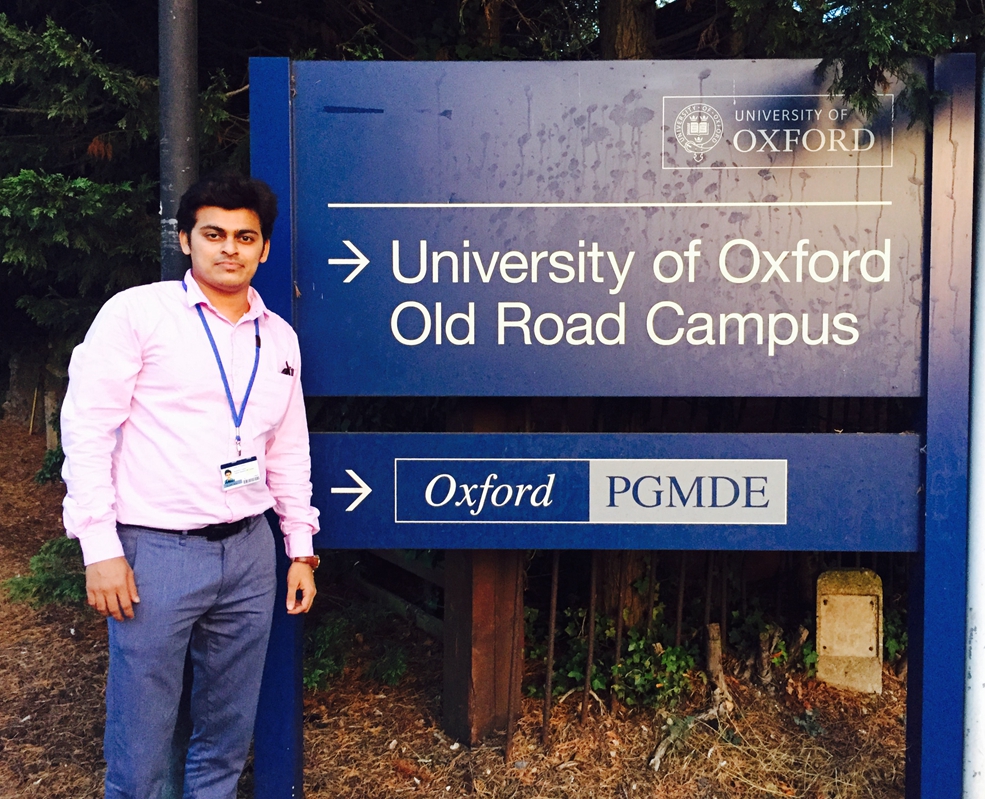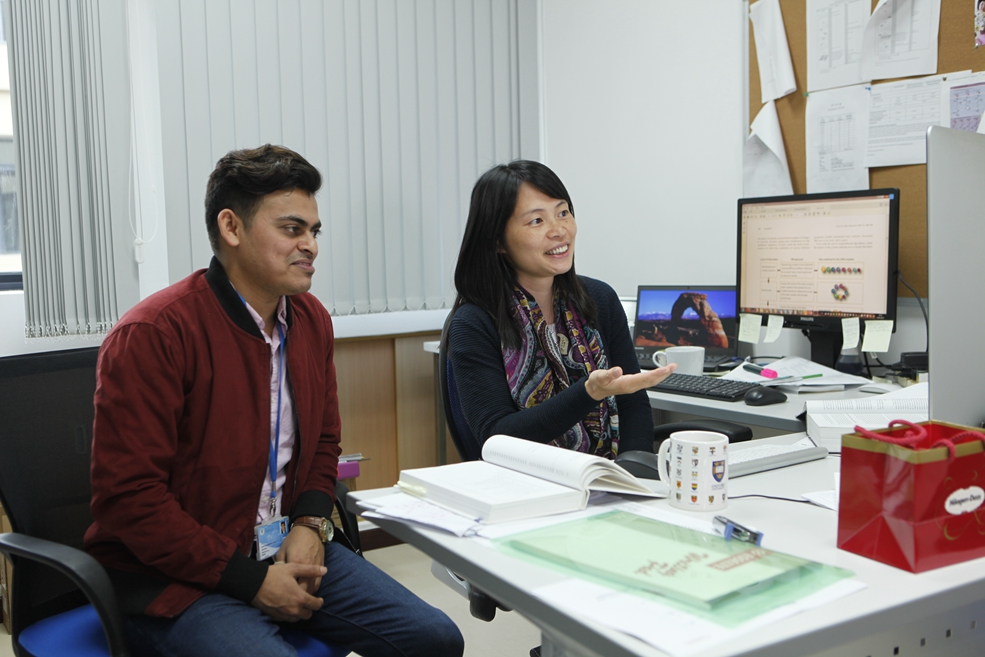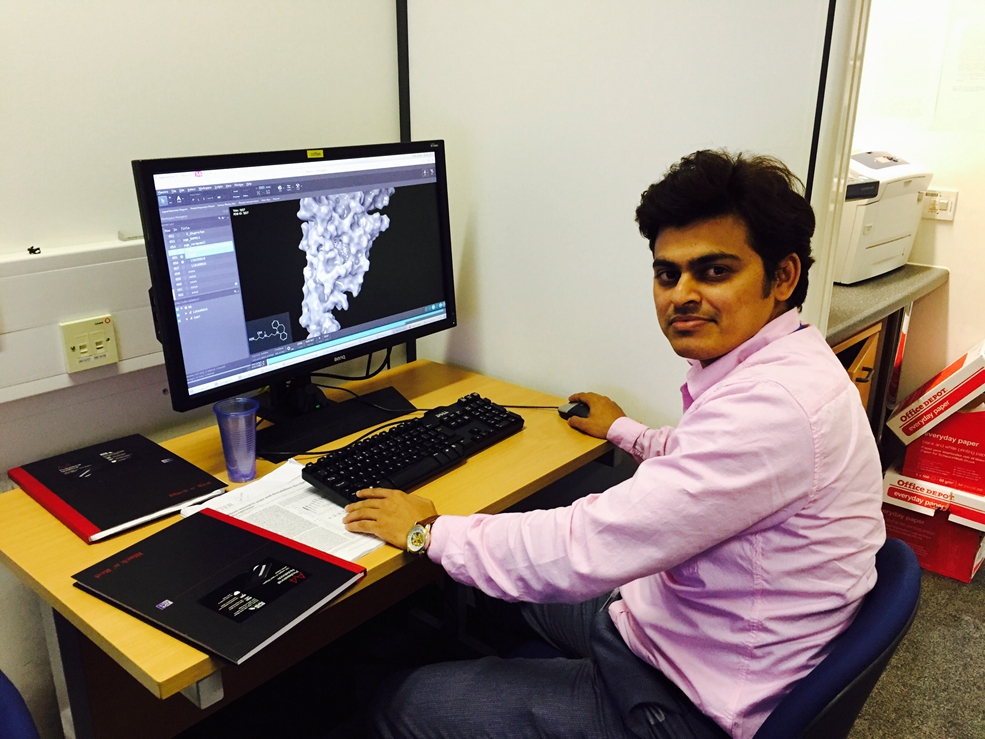Source: umagazine
The outbreak of Ebola in West Africa has claimed more than 10,000 lives since 2014. Faraz Mohammadali Shaikh, a doctoral student from the University of Macau (UM) Faculty of Science and Technology (FST), has developed compounds that destabilise Ebola during his recent internship at the Wellcome Trust Centre for Human Genetics (WTCHG), University of Oxford, United Kingdom. ‘It’s motivating to be part of the project and chart a path to end this epidemic,’ he says.
Work with Oxford Research Group
During his six-month internship, Shaikh participated in a drug design
project against the Ebola virus. is project was headed by Prof David Stuart,
director of Oxford’s Division of Structural Biology. The world-class research
group at the division is focused on using innovative experimental and
computational techniques to solve the complex problems of structure-function
relationship of viruses of different sizes, as well as the puzzles of
virus-receptor interactions and virus assembly.
Shaikh’s job was to work on the computational methods for designing drugs
against Ebola. He used computer simulations and fragment-based molecular
docking to explore viral activity – in particular how the virus enters the host
cell – at the atomic level, and to investigate ways to effectively inhibit
virus attachment and membrane fusion. The goal of this research project is to
identify chemical entities as potential candidates for developing drugs against
Ebola.
Stunning Learning Outcome
Ebola is a highly virulent pathogen which can cause a severe haemorrhagic
fever with a high death rate. In four months, the research group scanned 9
million compounds through computational analysis in order to obtain compounds
that can bind to Ebola and destabilise Ebola in thermos-stability assay. ‘I
didn’t have much time at Oxford and the clock was ticking, so I proceeded
everything in one shot. We’ve got some compounds that work. And I’m so proud
and thrilled that four compounds from my list were purchased by Oxford from the
same private company. The cost of each compound differs. All compounds cost
around 1,000 USD in total,’ says Shaikh.
What Shaikh achieved at Oxford far exceeded his expectations. In the beginning,
Shaikh just wanted to see how the Oxford research group executed their work.
Then he performed his task very well and contributed to a new discovery. ‘We
have also got the Crystallography structure of compound bound to Ebola
glycoprotein,’ he says. Decreasing the stability of GP the inhibitor could
prevent the fusion of the virus with endosomal membranes. We are currently
finalising the results and will publish a paper in some good impact journals
for this collaboration between UM and Oxford. We will keep working on Ebola
until we get something.’
Way to Oxford
As to how to get accepted by Oxford, Shaikh hints that it is not about
competition. He attended an interview with Prof Stuarts and Prof Yvonne Jones.
‘It lasted about 30 minutes, with questions related to my previous experience
and computational drug design skills, and that is it. Fortunately, things went
smoothly,’ Shaikh says.
Solid Research Experience at UM
Shaikh attributes the internship to his PhD supervisor Siu Weng In, an
assistant professor from the Faculty of Science and Technology. ‘It is Prof Siu who bridged me there. She has given
me a lot of constructive advice that has beneted both my life and my studies.
She has been guiding me no matter where I am,’ says Shaikh. Also, Prof Siu’s
strong background in computational biology often benefits him. After obtaining her PhD degree from Saarland
University in Germany, Prof Siu joined UM and has since led a research group in
bioinformatics. ‘ e way she works and instructs inspires me. Each new day
working with the group takes me one step closer to my goal – improvise
something that matters.
Shaikh admits that it is quite risky for professors to send their students
abroad for more than half a year. ‘ at might delay the research project she
has planned with me. And yet, Prof Siu is optimistic, supportive and contented
with whatever I work on in the lab there.’ Probably, thanks to such an
inspirational and friendly ambience at UM, Shaikh has been able to maintain his
enthusiasm and exceed his own expectations. ‘Prof Siu often encourages me to
take more challenges and her expertise in algorithm and molecular docking
offers me a very solid training in the first year at UM. And that has had a
great impact on my research visit to Oxford. Without my professor, it would not
have happened,’ he says.
Grow with UM
Shaikh was at a crossroads in his life when he considered studying for a
doctoral degree. Choices were many. In the end, Shaikh decided to study at UM
as he sees UM as a growing university. He prefers to be with the team where he
needs to do a lot of setup tasks. ‘I don’t want to work for a well-established
group. I want to progress with the team. I’ll apply what I have learned from
Oxford to my work here.’
‘UM has made a comprehensive analysis of the capability of each student. We are
always given the opportunity to execute whatever projects we have in mind.
Also, we’d gain a lot of support and resources from UM as long as the project
runs well. at actually makes UM a fast-growing university,’ says Shaikh. ‘In
just one and a half years, I’ve seen a lot of progress achieved here. Should
the opportunity arise, I hope to be part of UM in the future for any projects
on structural bioinformatics.’



